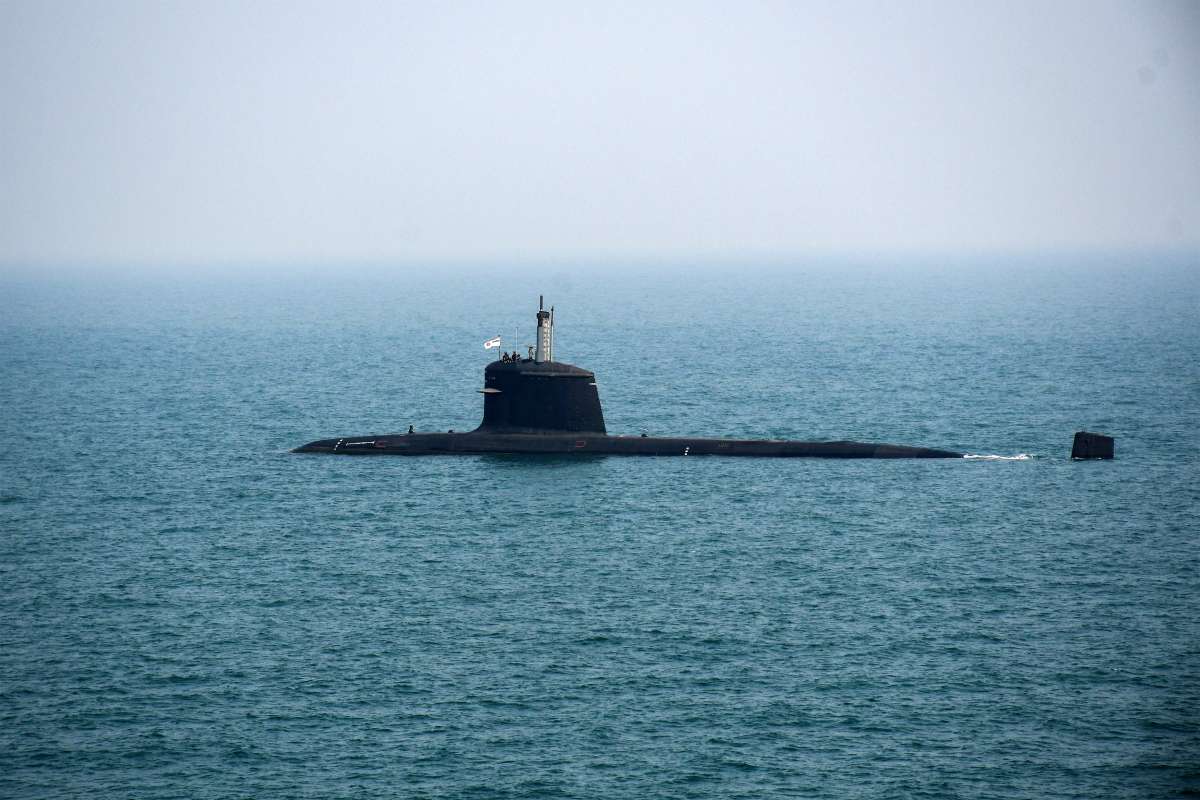The submarine is the second boat of the Arihant class indigenous nuclear submarines and will be supporting the existing INS Arihant, which was inducted in 2009…reports Asian Lite News
The Indian Navy commissioned its second nuclear submarine, INS Arighat, on Thursday. The commissioning of the second boat was done in the presence of the top defence, national security and military officials.
The commissioning was attended by Chief of Naval Staff Admiral Dinesh Tripathi, head of Indian Strategic Command Vice Admiral Suraj Berry and top DRDO officials. The nuclear-powered ballistic missile submarine will function under India’s strategic command.
The submarine INS Arighat is the second boat of the Arihant class indigenous nuclear submarines and will be supporting the existing INS Arihant which was inducted in 2009.
INS Arighat, India’s latest nuclear-powered ballistic missile submarine, is designed with formidable capabilities. Like its predecessor, INS Arihant, Arighat can carry up to four K-4 submarine-launched ballistic Missiles (SLBMs), each with a range exceeding 3,500 kilometers, or twelve K-15 SLBMs, which have a range of around 750 kilometers. The K-15 missiles can be equipped with strategic nuclear warheads, enhancing the submarine’s deterrent capabilities. In addition to its missile systems, INS Arighat is also armed with advanced torpedoes, making it a versatile and potent asset in India’s naval arsenal.
The Indian Navy has already developed and tested long-range nuclear missiles from the two boats even as it prepares to induct the third boat shortly with two more set to be ready by the year 2035-36.
The 6,000-tonne INS Arighat is set to embark on a long-range patrol of the Indo-Pacific armed with 750-km range nuclear ballistic missiles K-15. India’s third nuclear-powered ballistic missile submarine, INS Aridaman or S4, is also set to be commissioned next year, followed shortly after by a fourth nuclear-powered ballistic missile submarine codenamed S-4.
The Indian nuclear-powered ballistic submarines have been named the Arihant class which is a Sanskrit word meaning the ‘Destroyer of the Enemy’. The name befits the strategic significance of a nuclear-powered submarine.
Among the many options considered, the name ‘Arihant’ was selected and approved at all levels because of its subtlety and appropriateness in conveying the resolve. The Indian government has been planning to build both nuclear and conventional boats for its long-term submarine acquisition and capability development plan.
The Indian Navy has already approached the Narendra Modi government for the approval of two nuclear-powered conventionally armed submarines. These submarines can remain underwater for months, and their range limitation is only due to logistics, supplies and crew changes. Diesel-electric attack submarines, or SSKs, on the other hand, need to surface almost every other day to charge their batteries.
India is working on having five Arihant class boats along with the six nuclear attack submarines to be built in three blocks. In the conventional arena, the Indian Navy has already got six new Kalvari class boats and will get 15 more new boats in Project 75 India, Project-76 and Project-75 AS.
Given India’s location at the centre of the Indo-Pacific, the two submarines can offer huge strategic leverage and act as a deterrent to any navy trying to flex its muscles in the region. Both the INS Arihant-class submarines are powered with an indigenous nuclear reactor and indigenous nuclear missile. Since INS Arihant was a technology demonstrator, INS Arighat has plugged all technological gaps and, in that context, is a more advanced version.
Once S-4 is commissioned, India is set to launch the next class of submarines that are much larger — will be able to carry 3,000km range nuclear ballistic missiles and will have more missile tubes — the people said.
Since India already has land-based nuclear missiles such as the Agni series, and air launch nuclear capability, the submarine becomes the most potent weapon in the nuclear triad.
Meanwhile, the Indian Navy is set to acquire more teeth with the latest guided missile stealth destroyer INS Surat, stealth guided missile frigate INS Taragiri, and the sixth of the Kalveri class attack submarines INS Vagsheer – all set to be commissioned in the next few six months. Orders for three more Kalveri class submarines are expected to be placed with Mumbai’s Mazgaon Dock Shipbuilders Ltd this year, the people said.
The submarine has been under construction and testing since its launch in 2017 at the Ship Building Centre (SBC) in Visakhapatnam. With this commissioning, India continues to fortify its nuclear triad, enhancing its ability to maintain a credible second-strike capability.
Navy’s destroyer ‘INS Mumbai’ visits Lanka
Meanwhile, Navy’s warship, INS Mumbai, reached Colombo for a three-day visit with the Sri Lanka Navy ceremonially receiving the ship. This visit marks INS Mumbai’s first visit to a Sri Lankan port and the eighth visit by an Indian Navy ship to Sri Lanka in 2024.
During its stay, INS Mumbai will deliver essential spare parts for the Dornier maritime patrol aircraft operated by the Sri Lanka Air Force. The visit will include a familiarization tour of INS Mumbai for Sri Lanka Navy personnel, aimed at sharing operational practices.
Additionally, the ship’s Commanding Officer will meet with Rear Admiral WDCU Kumarasinghe, Commander of the Western Naval Area. As part of the visit, INS Mumbai will conduct joint activities with the Sri Lanka Navy, including sports events, yoga sessions, and a beach cleaning initiative. The visit is categorized as an Operational Turn-Around, during which the ship will replenish fuel and provisions.













